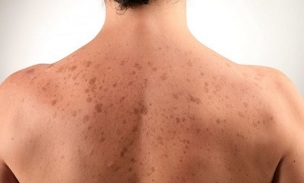With the modern development of medicine and a lot of research done, scientists cannot fully determine the true cause of the development of scaly lichen. Psoriasis is a disorder of the skin and tissues surrounding joints. The disease is characterized by a non-infectious course, with the appearance of papules and red spots, prone to fusion. These formations are dry, scaly, superficial and are a chronic local process. The microscope identifies a significant number of keratinocytes, cells of the immune system (T lymphocytes and macrophages), with the rich development of the vascular network.
Psoriasis and its cause, with the development of medicine, is being actively investigated, but no one has determined the ultimate cause that causes it.
Scientists define several main bases for the development of pathology:
- Genetic- genetic theory of the occurrence of psoriasis is based on the fact that if an ancestor or close relative has this disease, the risk of developing the diseaseThe next generation is 25% if either parent is ill. With the development of the disease in both parents, the risk of the disease in children increases up to 70%. A possible option is when a healthy child is born to a sick parent, but after a while, under the influence of the above factors, the disease develops in the person.
- Immune Defects- Histological examination of psoriasis patients discovered an excessive accumulation of diseased immune cells inlayers of the epidermis. At the same time, specific antibodies are found, and in the superficial layers of the epidermis - Munro micro-absorption (accumulation of intercellular fluid, leukocytes, macrophages). A general blood test shows an increase in the number of white blood cells (T-helpers), which speaks of the autoimmune nature of the disease.
- Viral injury- in this case, retrovirus infection. The strain introduces its own tRNA sequence into the host cell, replacing its genetic code with that of the virus. Manifestations of overproduction and multiplication of immature and undifferentiated cells of the dermis.
An interesting fact is that the autoimmune theory anti-psoriasis treatment aims to reduce the number of immune cells, including T-helpers. With psoriasis in people with HIV / AIDS, the number of these cells decreases to a limit, and the risk of developing psoriasis increases. Further investigation of this fact can completely refute the autoimmune theory about the development of psoriasis.
Psoriasis development factors

What causes psoriasis? There are several provocative factors that have a negative effect on the body:
- Stress- this factor triggers psoriatic flare-ups and is the last link, under the influence of the rash will be reduced. This factor is one of the main ones, since the onset of psoriasis in 50% of cases occurs primarily from overwork, psychological trauma, and nervous stress. When psoriasis remission begins, any emotional shock can cause a relapse;
- Infection- a group of diseases, with the development of initial foci of a psoriatic rash. Such diseases include: all infectious diseases of the upper respiratory tract, bacterial and fungal infections that affect the skin, mononucleosis. In patients with psoriasis, the presence of an increased number of pathogenic microorganisms (streptococcal beta and Staphylococcus aureus) is determined. Candida yeast disease is a fungal infectious process in which psoriasis develops most often;
- External effects- quite a few patients associate the appearance of psoriasis to external physical factors. Usually these are: mechanical trauma to the skin, burns, hypothermia and frostbite;
- Endocrine diseases- this group of diseases is accompanied by impaired function of the whole body. This factor is most often found in female sex, due to frequent changes in hormone levels associated with growth, pregnancy, menstrual cycle, and menopause. In diabetic patients, the metabolism is significantly disturbed, while the excess of glucose constantly negatively affects the human tissues and organs, stimulating the development of other diseases. ;
- Toxins- acts as another cause of psoriasis on the body. Its occurrence has been linked to food poisoning, working in factories or factories, abuse of certain products (citrus fruits, coffee, chocolate). Alcohol and smoking, with their toxic effects, cause many diseases, including psoriasis;
- Disease hereditary effects includemedication.It has been shown that a small number of patients begin to develop psoriasis while taking the following drugs: NSAIDs, beta blockers, boosters (vitamins C, B, D), inhibitorscells, antibiotics (cephalosporins).
Psoriasis prevention
Many factors contribute to the development of psoriasis. The basic theory has yet to be defined and any precautions should be comprehensive, pursuant to the goal. The patient should reconsider his or her lifestyle. If necessary, change your residence to a more eco-friendly area.
Should avoid stressful situations. Can use antidepressants, sedatives. The diet should include plenty of fiber, allergen-free fruits and vegetables, meat, and fish. When treating the same diseases, it is necessary to quit bad habits, consult your doctor about alternative therapy. Take part in treatment courses in specialized nursing homes.























